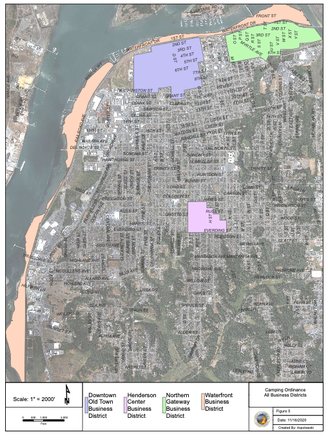
Map showing the business districts where camping is prohibited. From the City of Eureka
Following hours of discussion on Tuesday night, the Eureka City Council voted to move forward with an ordinance that prohibits camping in city parks, near trails and in several business districts. The vote was 4-1, with Councilmember Leslie Castellano dissenting.
City Attorney Robert Black explained to the council that the new ordinance would replace the city’s existing camping ordinance — which essentially says it is illegal to camp anywhere in the city at any time — with something that is less restrictive and in “compliance with the state of current law.”
The decision is in response to the court ruling in the 2019 Martin v. City of Boise case, in which the Ninth Circuit Court of Appeals overturned Boise’s camping ordinance on the grounds that it criminalized “conduct that is an unavoidable consequence of being homeless — namely sitting, lying, or sleeping on the streets.”
The new ordinance allows for “involuntary camping” — meaning camping when no other shelter is available to the person — in most parts of the city during nighttime hours, specifically precluding the “the period from fifteen minutes after sunrise to fifteen minutes before sunset.” As written, the ordinance bans camping any time of the day or night in city parks, near trails, and anywhere in the Downtown/ Old Town Business District, the Waterfront Business District, the North Gateway District and Henderson Center.
Many community members spoke during the meeting against the council adopting the replacement camping ordinance, some voicing concerns about the new ordinance potentially criminalizing homelessness.
“Rewriting an ordinance that has been found unconstitutional due to criminalizing one’s status as homeless does not bode well for or appear consistent with the city’s goals,” Rebecca Smith who works for Legal Services of Northern California said to the council.
Several commenters, including Nezzie Wade of Affordable Homeless Housing Alternatives (AHHA), also had concerns about how much of the city would be rendered off-limits for camping.
“This is really extensive, if you look at the maps and see what’s being suggested,” Wade said to the council. “The idea is to get people off the street…Where do they go?”
Councilmember Leslie Castellano echoed many of these concerns and suggested that the council reduce the areas where camping is restricted, something the council may revisit during the next reading of the ordinance at a later meeting. Castellano also had concerns about the enforcement of the ordinance, and what would be considered “involuntary camping” currently, with some individuals wary of staying in a shelter during the pandemic.
Several other council members expressed concern about the enforcement and whether this ordinance would result in the jailing of homeless people. Attorney Black and Eureka Police Captain Brian Stephens both said that enforcement would be “dialogue based” and more about finding alternatives for the camping individuals, using enforcement as a last resort.
“Services are our primary goal,” Stephens said during the meeting. “That’s the ultimate goal is to get people off the streets…This will give us a better enforcement tool to address that.”
The council ultimately decided to alter the ordinance, changing the penalty for illegal camping from a misdemeanor to an infraction. The council also directed the city attorney to make changes to the language defining “involuntary camping” to make it more specific. The ordinance will come before the council for a second reading and adoption at a later meeting.
Councilmember Kim Bergel said that, although she does not feel this ordinance is “perfect” she felt that it was a necessary step in addressing the needs of the community. “I support this ordinance because I think it gives some relief to our business owners,” she said. “It gives a feeling of safety to our community who is walking on the trails…The reason I support this is that it supports our local business and our city as a whole.”
###
In related business, the council also unanimously adopted the Crowley Site Local Coastal Program Amendment, changing the zoning of the site to allow Betty Chinn’s PG&E trailer housing project to finally move forward. The Outpost will have more on this later.
CLICK TO MANAGE